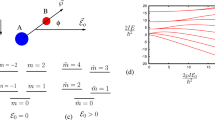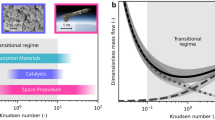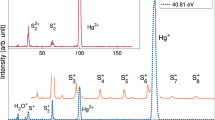Abstract
THE ionization of gas or vapour molecules by collision with excited rare gas atoms has been studied in detail by Jesse and Saduskis1. Ionization occurs when the excitation potential of the rare gas is equal to, or greater than, the ionization potential of the colliding molecule. The vapours of nearly all organic substances have ionization potentials lower than the excitation potentials of the first three noble gases so that ionization by collision with excited rare gas atoms forms the basis of a method for measuring low concentrations of organic vapours.
This is a preview of subscription content, access via your institution
Access options
Subscribe to this journal
Receive 51 print issues and online access
$199.00 per year
only $3.90 per issue
Buy this article
- Purchase on Springer Link
- Instant access to full article PDF
Prices may be subject to local taxes which are calculated during checkout
Similar content being viewed by others
References
Jesse, W. P., and Saduskis, J., Phys. Rev., 100, 1755 (1955).
Lovelock, J. E., J. Chromat., 1, 35 (1958).
Lovelock, J. E., James, A. T., and Piper, E. A., Ann. N.Y. Acad. Sci. (in the press).
Author information
Authors and Affiliations
Rights and permissions
About this article
Cite this article
LOVELOCK, J. Measurement of Low Vapour Concentrations by Collision with Excited Rare Gas Atoms. Nature 181, 1460–1462 (1958). https://doi.org/10.1038/1811460b0
Issue Date:
DOI: https://doi.org/10.1038/1811460b0
This article is cited by
-
A micro electron capture detector for temperature programmed analysis with capillary columns for a wide range of applications
Chromatographia (1977)
-
Der Spitzenentladungsdetektor mit Stickstoff als Tr�gergas in der Gaschromatographie
Mikrochimica Acta (1975)
-
Zum Spitzenentladungsdetektor für die Gaschromatographie
Microchimica Acta (1972)
Comments
By submitting a comment you agree to abide by our Terms and Community Guidelines. If you find something abusive or that does not comply with our terms or guidelines please flag it as inappropriate.



